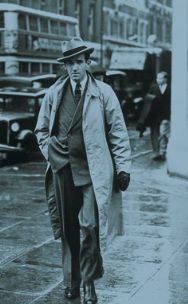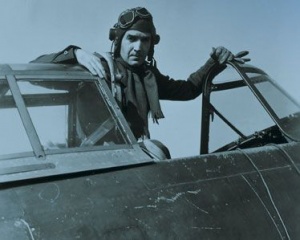Personal tools
Help
Tools
Class Notes
- Do you have news for fellow WSU alumni and other readers of Washington State Magazine? Send us your class note.
Our Story
written by alumni, faculty and friends.
NOTE: THIS IS A LEGACY SITE AND IS NOT REGULARLY MAINTAINED
Views
Where Have You Gone, Edward R. Murrow?
From Our Story
From Washington State Magazine, Fall 2005
In recent months the government has been accused of placing propagandists in the chairs of journalists and issuing reports as objective, when they were actually part of partisan politics. Moreover, the parade of programs posing as news, with special angles, promotional self-interests, and downright political stances, makes one question the existence of journalistic objectivity and integrity.
In an effort to make things right, the Federal Communications Commission has recently called on television to clearly disclose the origin of video news releases (VNR) used in their programs. Also, a proposed bill in the U.S. Senate would require that "VNR's produced, distributed or otherwise paid for by the federal government clearly identify the federal government as the source of such material."
Many local newscasts run stories astutely packaged by public relations firms or special interests vying to get their products or ideas before the public. The news story on the features of that new auto, the menus of that new fast food chain, the achievements of that new medical center's experiments, or the virtues of a political stance are not really dug up by news journalists, but by PR practitioners. Now politics have entered this game.
Journalists have always been wary of pre-packaged news stories, traditionally in the form of news releases. Yet tradition seems to be changing. What's more, the current parade of media pundits and talk show hosts has given the public a negative perspective on the press. Is there a higher journalistic standard than this current cacophony?
It's an issue that warrants some recollection of the journalistic values forged by Edward R. Murrow '30.
The McCarthy Issue—1954
It was March 8, 1954, in one of the meeting rooms of CBS. Edward R. Murrow and producer Fred Friendly had been working on a documentary about Joseph McCarthy, the junior U.S. senator from Wisconsin who had taken upon himself the investigation of communists in government. McCarthy had made allegations of treachery and spying, disloyalty and subversion, eventually suggesting that even President Dwight Eisenhower might be soft on communism. Many government workers, mostly innocent bureaucrats, had their careers, if not lives, ruined by McCarthy's allegations.
Most of the press were shy about countering McCarthy for fear of having their own reputations attacked. But now McCarthy's demagoguery was to be challenged on network television by Murrow on his program See It Now.
The production team was somber as it considered the impact of the program. Friendly spoke: "We're going up against McCarthy, and we have to be sure we don't have an Achilles heel as a way for McCarthy to get back at us. Any weakness in any of us would be used against Ed. If any of you might be that vulnerable part, let him speak now or forever hold his peace."
Some spoke of friends or ex-spouses who had once associated with communists. But then Murrow concluded, "The terror is right here in this room. We go tomorrow night."
Reputations were at stake. Being branded a communist sympathizer could be the professional undoing of a journalist. Murrow knew he could lose his reputation as a trusted voice on radio and television.
On one occasion film producer Samuel Goldwyn, Jr. told Murrow that it took courage to stand up to McCarthy. "Let's face it," Ed said, "McCarthy can't hurt me except economically. I was born with an outside toilet, and I can go out the same way."
Courage and integrity
Not long after the Murrow family moved from Ed's birthplace of Polecat Creek, North Carolina, to the Skagit Valley of Washington, he was threatened by an older boy who tried to scare him with a BB gun. The seven-year-old Ed, then known as Egbert, taunted his tormentor to "go ahead and shoot." The boy obliged, hitting him between the eyes, giving him a scar that he carried for life.
When Murrow was 14, he began working summers in the logging camps near his home in Blanchard. His job seemed simple enough, riding a steam-powered donkey engine and blowing its whistle as a signal to the timber workers for the next step in the cutting process. But there were hidden dangers. Logs could break loose from the flat cars, or the brakes would wear out, sending the cars off the tracks on the curves. Yet Murrow seemed to live on the excitement of such dangers.
It was about this time, amid the rough-cut loggers with whom he worked, that he changed his name from Egbert to Ed, a more comfortable fit, he thought, for the kind of person he saw himself to be.
At Edison High School, he was persuaded to join the debate team. Even though he sweated profusely from nervousness, his teacher, Ruth Lawson, taught him how to overcome his fear of public speaking. Soon, he learned to speak with conviction, earning himself "best debater" in a state competition. Yet even after he had reached professional levels in radio and television, he continued to sweat.
At Washington State College, Murrow took a speech course from a teacher who turned out to be an important mentor, Ida Lou Anderson. (See sidebar.) There, he learned not just technique, but also ideas. Anderson's favorite philosopher/rhetorician was the Roman emperor, Marcus Aurelius. It is perhaps from him that Murrow absorbed the ideals embodied in such pronouncements as "You will find rest from vain fancies if you perform every act in life as though it were your last," or "A wrongdoer is often a man who has left something undone, not always one who has done something."
Somehow, Ed had learned not to freeze up with fear or become passive, but to find courage within himself. Courage exhibited itself again when he found himself covering World War II in Europe from London. Once, he reported from the rooftops there while bombs were falling nearby, for the first time bringing the sounds of a war to his American listeners.
Later, he persuaded the military to let him describe the war from the air by flying in a bombing run over Berlin. Murrow not only survived the experience, but gave a running account of the flak exploding around him, the searchlights that found his plane, the evasive dives the pilot made to avoid being hit, and the bombs as they were released from the aircraft. Other journalists admitted they would not have undertaken such a foolhardy mission, but Murrow seemed exhilarated by such challenges. That courage would reveal itself again, 10 years later, when he confronted Senator Joseph McCarthy.
Even later in Murrow's career, he spoke to the Radio-Television News Directors Association. After mentioning that what he was about to say was probably foolhardy, he spoke of how television "insulates us from the realities of the world in which we live." Although he was known by many to be fearless, he said he was "seized by an abiding fear regarding what these two instruments [radio and TV] are doing to our society, our culture and our heritage." Then his well-known lines: television "can teach, it can illuminate, and it can even inspire. But it can do so only to the extent that humans are determined to use it to those ends. Otherwise, it is merely wires and lights in a box." Some saw this as heresy. Murrow made many colleagues angry, including the executives at CBS. But he felt he owed a duty to his conscience.
Murrow was known for his work ethic as well as his courage. As vice president of CBS News, he never considered himself an executive who let others do the work. He had come from hard-working stock. His father, Roscoe, was a farmer in North Carolina and a railroad worker in Washington. From age four, Ed had learned to draw water from the well, feed the chickens, weed the garden, and slop the pigs. His mama taught, "If you can't pay for it, you can't afford it." When he turned 12, Murrow was hired by neighboring farmers to drive a line horse. A Murrow did not turn down work for pleasure. Ed later recalled, "I can't remember a time in my life when I didn't work."
Perhaps what makes Murrow most memorable was his command of the language and his gift for effective communication. Perhaps these came from his hearing the Bible read aloud to him when he was young. Mama Ethel read with theatrical flair and made the Bible stories come alive. "The world lost a great actress," said her other son, Dewey, "when my mother didn't go on stage." From his mama, Ed learned the old locutions that survived in his family since the Revolution: "ere" for "before," "commence" for "begin," "forth and back," "t'was"—and profound inversions like "this I believe."
Murrow combined the dramatic flair learned from his mother and Ida Lou Anderson with his courage and diligence as he wrote journalistic history by bringing World War II into the living rooms of America, laying his career on the line to battle a grandstanding demagogue, and then doing his idealistic utmost to maintain integrity in an industry that was largely his creation.
Val Limburg joined the WSU Communication faculty in 1967 and retired in 2002. He taught thousands of broadcasting students, using Murrow as the touchstone example for media credibility and ethics.
Our Story site map
Our Story main page | Our Story categories | Help Desk
Contact | Give | Advertise
Washington State Magazine | Washington State University | Class Notes
Our Story is coordinated by
In partnership with
Our Story and Washington State Magazine are publications of Washington State University. All rights reserved.
P.O. Box 641227, Washington State University, Pullman, WA 99164-1227 USA | wsm@wsu.edu, 509-335-2388
Accessibility | Copyright | Policies


